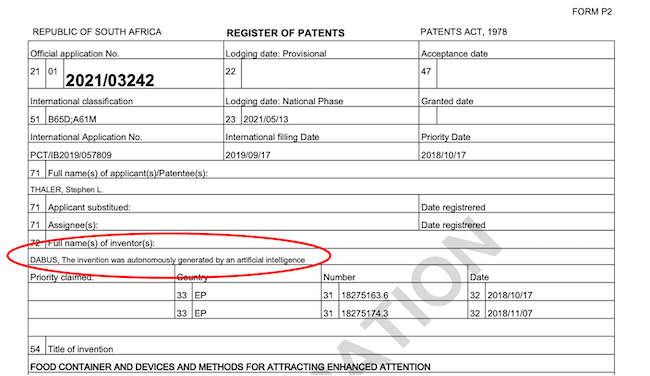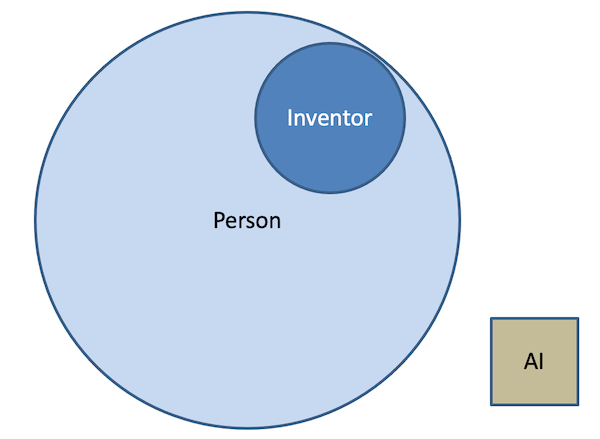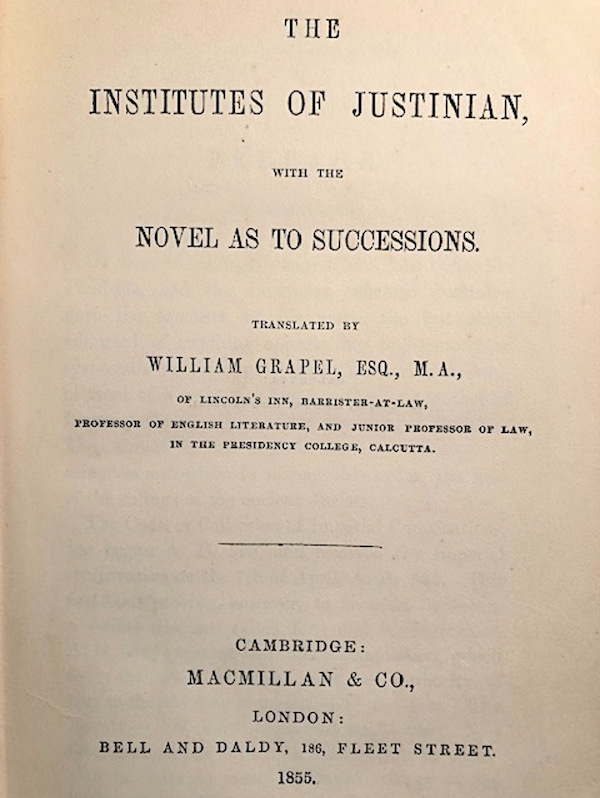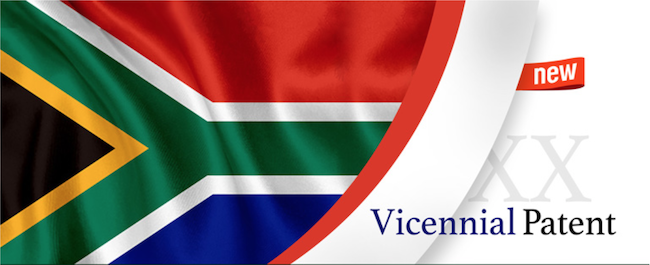Can AI be an inventor? DABUS, a South African perspective
On 27 July 2021 the South African Patent Office granted patent no. 2021/03242 for a “Food container and devices and methods for attracting enhanced attention”. The patent was filed by Stephen L. Thaler and cites “DABUS, The invention was autonomously generated by an artificial intelligence” as the inventor.
Most patent attorneys regard this as an aberration, pointing out that the South African Patent Office does not conduct substantive examination of patents. However, this patent did pass formal examination.
Although, this patent did not properly cite the “inventor”, there is basis in South African law for permitting inventions made by Artificial Intelligence (AI).
Definition of Inventor
The South African Patents Act recognises “inventors” and “persons”:
27(1). An application for a patent in respect of an invention may be made by the inventor or by any other person acquiring from him the right to apply or by both such inventor and such other person.
In terms of the Interpretation Act, a “person” includes a “company” and “a body of persons incorporate or unincorporate“. However, by associating “inventor” with references to “he”, it appears that the legislature intended “inventor” to be limited to a “human being”. AI is not a company, a body of persons or a human being. So, clearly AI cannot be cited as the inventor.
Assignment
Where the applicant is a person other than the inventor, the South African Patents Act requires proof of assignment from the inventor to be submitted:
22(1)(d). where the applicant has acquired a right to apply from the inventor, [the applicant must submit] an assignment or other proof, to the satisfaction of the registrar, of the right of the applicant to apply;
Since AI cannot sign an assignment document, what “proof, to the satisfaction of the registrar” can be submitted?
The answer lies in Roman Law.
Roman law – “slave”
Where there is a gap in South African law, we have regard to Roman-Dutch Law.
AI is akin to a slave in Roman times – a slave was able to create, was regarded as a “res” (property), and could not own property.
According to the Justinian Institutes:
Book 1, Title 8 Section I: Slaves are in the power of their masters … whatever is acquired by the slave is acquired for the master.
Book II, Title 9, Section III: Whatever, also, our slaves acquire, whether by delivery, contract or, in any other way, is acquired for us; and this, even through we are ignorant of, or averse to, such acquisitions; for the slave himself, being in the power of another, can have no property of his own.
Inventions created by a slave were owned by the owner of the slave.
But what if AI runs on an Amazon Cloud instance (owned by Amazon)? Do AI inventions vest in Amazon? No, Roman Law also considered ownership of goods made by a leased slave.
Book II, Title 9, Section IV: In regard to those slaves in whom we have the usufruct only, it has been held, that whatsoever they acquire by means of our property, or by their own labour, shall belong to us; but that what they have acquired from any other source, shall belong to their real owner.
… inventions by a leased slave were owned by the lessee.
It is not relevant who trained the slave (i.e. wrote the AI code). Only ownership / lease rights are relevant.
Roman law – property
Alternatively, we could have regard to the Roman property law concept of “fruit”:
Book II, Tile 1, Section XIX: The offspring of animals of which you are the owner becomes, by some natural law, your property.
If we consider AI as the “principal” and the invention it creates as the “fruit”, by “some natural law”, the invention is owned by the AI owner (or lessee).
Whether one prefers slaves or fruit, the owner / lessee of AI need only show ownership / lease of AI to prove assignment.
But, what if the owner / lessee of AI is a company? How can a company be regarded as an “inventor”? Well, this step is a little more tenuous …
The South African Patent Regulations appends Form P3, which includes the following statement:
the inventor(s) of the above-mentioned invention is / are the person(s) named above
The Regulations conflate “inventor” and “person”.
It is a principle of interpretation of Statues that, where there is a conflict, the statute must be read to reconcile the conflict:
The language of every part of a statute should be so construed as to be consistent, so far as possible with every other part of that statute. (Chatobhai v Union Government 1911 AD 13)
Now it is a well established canon of construction that different parts of the same statute should, if possible, be construed so as to avoid a conflict between them. (Amalgamated Packaging Industries Ltd v Hutt & another 1975 (4) SA) 943 (AD), quoting Minister of the Interior v Estate Roos 1956 (2) SA 266 (AD))
And, the only way to reconcile this conflict is to broaden the scope of “inventor” to that of “person”.
… only one problem: the conflict arises from the Regulation and not from within the Act.
DA van Zantwijk (Patent Attorney, Sibanda & Zantwijk Patent Attorneys)
About S&Z Patent Attorneys
S&Z (together with GlobalIPCo) created the SANi Patent (a combination South African and Nigerian patent) and Vicennial Patents (with renewals paid “to term”), and is the largest filer of South African patents (filing about 5,000 patents per year).
